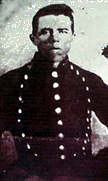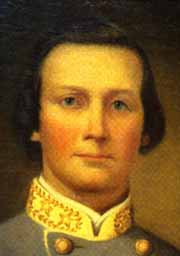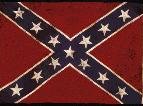South Carolina
C.S.A.


South Carolina
C.S.A.
|
South Carolina C.S.A.
|

|
|

|
South Carolina C.S.A. |
|
Company H Sixteenth South Carolina |
|
M.K. Robertson Born November 8, 1842 Died June 24, 1915 Background is the grave of M.K. Robertson Photo by Kelly O'Hara and Kathy Griffith |
|
He was sitting on the porch looking for me and Dr. C.C. Brown, who was to go with me that day. Said he wanted to see (obliterated by fold) and tell him what he thought of him, after reading his writings for so long. I told him that Dr. Brown would come some day; he said he might not be here then, “for I know my time is short.” Then we talked of the after world. He said all fear was gone and the way clear. He talked of his departure as a child would of a mountain trip or going to spend the day at Granny Betsy’s, So strong was his faith in God that he was not living here any more. He had already received the joy of the new citizenship; had finished the higher battle of life. In a few days the call came and he quietly answered, leaving his house in perfect order. I copy the following facts about his life from his own hand. Born: November 8, 1842 Left home as a soldier: November 24, 1861 Returned Home: May 10, 1865 Married Elizabeth Fowler, June 1, 1865 Joined the Baptist Church, September, 1865 Deputy County Treasurer for Two Years Postmaster at Greenville 1870-74 County Auditor 1874-77 Enumerator of the Census 1880-1890 Postmaster at Greenville 1888 –5 Postmaster at Tigerville 1905 –15 He lived on his convictions unmoved by public opinion or by private friends. He raised a large and worthy family. He was loved by all who knew him. J. Dean Crane The Baptist Courier Date Unknown Thanks to Kelly Jane O'Hara and Cathy Griffith |
The Republican Mountain Unionist! An Honest Man trapped in time, by his own convictions, will be well remembered. The mountain people and the people of the south are given to understatement, although the shared language is English, you must listen closely to what is being said. Even then, the listening may not be enough; you must know the people and the region to understand the value of the word. This is certainly the case in the legendary Dean Crain's obituary for his friend Mitchell, "Dock" Robertson. Read the last line, a marvel of tribute being paid to one of the great dissenters of the Sixteenth Regiment and Greenville County. What is unsaid is as important as what is said. We must understand first, that we don't understand about the past, a time of hidden tokens and symbols, and subtle communication. Postmaster of Greenville, a Federal job, one controlled by Republican or Radical Patronage. Robertson was a radical republican, a unionist from the mountains; he was an organizer and power within that party in Greenville County. He proved his leadership again and again, and in the hottest election in South Carolina's history, he proved it by running and loosing against the man who would in time become known as the "High Sheriff," P.D. Gilreath. Most importantly, "Dock Robertson stayed and lived a full life and never recanted his support of the Union. Like the best of the Republicans, he continued to serve in Federal appointments long after the radicals were driven from power. In addition, he was respected and loved by his neighbors and friends of the mountains and remained there undisturbed until his death. M.K. Robertson and his brother-in-law Lt. A.A. Stewart (Married: Louisa Jane Robertson Stewart) were the best face of the radical republicans in Greenville County. Pre-war Unionist, they never stepped back from these convictions, even when serving the confederacy with the Sixteenth Regiment. They sleep now, like the others, bound together with those who honestly opposed them, in the soil with which they labored. Small gray marble stones and aging newspapers being the only markers that point to forgotten battles fought in the shaping of the south that was reconstruction, for just as there were Redshirts, there were also Republicans. Both sides able to continue on because although poles apart in politics, they were joined forever by the experience that was this war and the history that at one time joined the entire region. Good men, fair and true, can oppose one another, and emerge with the respect of all, but the character to do so is not often to be found and can only be molded by the time. The more difficult the time the better the man, and in the south no time was more difficult than the time of M.K. Robertson. |
|
In order to show just how remarkable M.K. Robertson was, one need only consider the case of one his contemporaries, James M. Allen. James Allen was the Senator representing Greenville County at the height of Reconstruction. He was from the state of New York and was a stonecutter by trade. He was given several government contracts, to repair the State House in 1869, to enlarge the State Asylum in 1870, and to construct City Hall in Columbia in 1871. He served as postmaster of Greenville, Treasurer of Greenville County, and was also the Vice President of the Union League of South Carolina in 1870. The Union League was the Republican Klan, an organization that gets little attention and virtually no mention. In 1873, as treasurer of Greenville County, he defaulted on money due the State Treasury and was arrested, tried, convicted, and sentenced to serve one year in the penitentiary, and fined $2,000. However, Governor Franklin Moses, one of the worst of the radicals pardoned him and he returned north. Many years later in 1901, a mysterious coffin was found in the Greenville County Courthouse in the attic held in storage. The coffin aroused considerable interest in the community and resulted in considerable speculation as to its origin. After a period of time, Captain J.N. King came forward with explanation about the mysterious courthouse coffin. At the height of reconstruction, the Allen scandal had rocked the county. In 1873, with redemption by Hampton still 3 years away, the pardon of Allen prompted certain individuals in Greenville County to send a coffin to the courthouse with instruction to Treasurer Allen to leave at once. “Allen was too wise not to obey these orders, knowing that if they were not carried out to the letter, he doubtless would be hanged. So he left during the night for parts unknown, depositing the coffin in the loft of the courthouse." It had since remained unmolested until it discovery in 1901. (Biography of the S.C. Senate, History of Upper Greenville County, Mann Batson) So Sergeant M.K. Robertson, an honest Republican during reconstruction was lamented and mourned, not just by those who agreed with him politically but also be those who disagreed with him. The mountain unionist was not always the reviled monster painted by many. More often than not, he was a man like Dock Robertson, who followed his heart and spoke his mind. In any time, those who are wise respect the ability to stand against the crowd and applaud those who do so. |
|
|
| Precinct | P.D. Gilreath Democrat | M.K. Robertson Republican |
|---|---|---|
| Greenville City | 934 | 843 |
| Yeargin | 146 | 55 |
| Charles | 189 | 113 |
| Wares | 158 | 35 |
| Stokes | 211 | 51 |
| Sullivan’s Factory | 112 | 52 |
| Stones | 260 | 72 |
| Burdettes | 197 | 100 |
| Batesville* | 224 | 54 |
| Reedy River Church* | 205 | 63 |
| Chick Springs* | 214 | 90 |
| Double Springs* | 221 | 52 |
| Mitchells* | 219 | 23 |
| Glassy Mt.* | 183 | 41 |
| Goodwins* | 163 | 42 |
| Brutons* | 106 | 50 |
| Hoods* | 95 | 38 |
| Marietta* | 188 | 66 |
| Total | 4025 | 1840 |
|
In the Greenville City precinct, white voters cast 925 votes and black voters cast 852 votes. Sheriff Gilreath would hold his office until the turn of the century, when his son replaced him. See the book High Sheriff for more information about his life and tenure as sheriff, his service in the Sixteenth South Carolina, Company F, and his service with Hampton’s Cavalry in the Army of Northern Virginia. He is buried in Springwood Cemetery in Greenville. |
|
All people, even those who love history and should know better, think in black and white terms. This is misleading at best as there are no absolute rules in human behavior, or absolute dates. Like the people who carry them, habits may be mitigated but they tend to return. Not even the blight that was republican reconstruction could result in the immediate and complete destruction and eradication of the Republican Party. Most people, even historians and serious students of Reconstruction tend to think that the Republican Party simply evaporated and returned to the North in 1876. This was not the case, in areas, particularly the area around Beaufort and to a lesser extent the mountains. Rather the disappearance of the Republican Party from South Carolina was gradual, it extended until the Tillman Era and beyond. Surviving on patronage, through the use of Customs, Postal and other positions it continued to linger, a vestige of its past self. Nothing illustrates the slow demise of the Republicans more clearly than the following article from the newspaper, quoted from the book, A History of Upper Greenville County. The Radicals of Greenville, April 5, 1880 “A convention of the Republicans of Greenville county assembled in obedience to a call of the chairman of the State Executive Committee to choose delegates to meet at Columbia, April 25th, to elect delegates to the National Republican convention at Chicago, to nominate a candidate for President of the United States. “The convention was called to order by B.N. Arnold, county chairman, on motion the meeting was organized with J.B. Hyde as temporary chairman and J.A. Bramlett, Secretary and T.L. Brayton, assistant secretary. “On motion a committee of three was appointed on credentials of delegates; viz: S. Johnson, J.P. Scruggs, and M.K. Robertson. Said committee upon examination reported forty-five delegates from fifteen Townships as follows: (Only the townships in the Upper Part of the County are listed) Bates Township – D. Blythe, S. Rosemond, E. Turner Chick Springs Township – Lewis Blythe, John W. Hooker Cleveland Township – W.B. Johnson Glassy Mountain Township – M.K. Robertson, Harris Pitman, Sr., J. Rochester O’Neal Township – D.M. Greer Paris Mountain Township – D.U. Lee, H. Hurd, A. Johnson “On motion J.B. Hyde was elected permanent president and T.L. Brayton permanent Secretary. “On motion three tellers were appointed, as follows, M.K. Robertson, J.A. Bramlett, D.U. Lee. “The convention then went into discussion of candidates. The following persons were put in nomination: A. Blythe, William Kennedy, J.P. Scruggs, B.M. Ashcraft, B.F. Donaldson, Wilson cook, Thomas Briar, and J.B. Hyde. "On motion, the secretary was instructed to call the roll and each member as his name was called would rise and name four candidates for whom he would vote. After the votes were called and recorded, it was found that A. Blythe had received 42, W. Kennedy 38, J.P. Scruggs 23, Thomas Briar 29, and were thereupon declared elected. On motion the election was made unanimous.” |

|
|
|

|